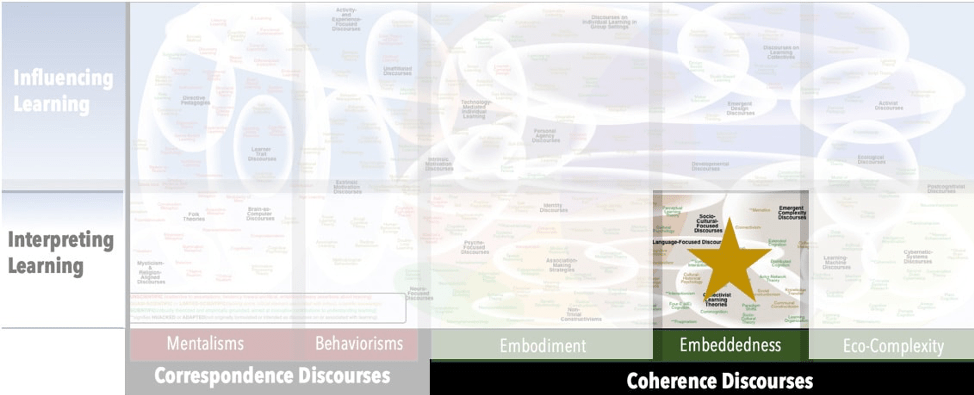AKA
Structural Functionalism
Focus
Interpreting human action in systemic termsPrincipal Metaphors
- Knowledge is … achievement, accomplishment
- Knowing is … goal-oriented action
- Learner is … an actor (situated individual)
- Learning is … progressing, gaining
- Teaching is … N/A
Originated
1930sSynopsis
Action Theory is a sociological perspective on social science research that asserts personal motivations (e.g., ends, purposes, ideals) must be considered when examining human actions. Action Theory explicitly rejects a realist/idealist (positivist/interpretivist) dichotomy, grounding itself instead in more systemic and contingent notions that compel simultaneous consideration of micro and macro factors contributing to human action. Associated discourses (presented chronologically, by decade) include:- Will Psychology (Wilhelm Wundt, 1890s) – a precursor to Action Theory in which “motivation” was distinguished from “volition” (or “will”). In this frame, will is seen as the intellect’s means of acting on a motivation – that is, of translating desire or intention into meaningful action.
- Social Action Theory (rooted in the work of Max Weber, elaborated by George Herbert Mead; 1910s) – a perspective that interprets social interaction as a negotiated tension between personal desires and social pressures. Although Social Action Theory technically predates Action Theory, the latter is usually considered the broader, more encompassing frame.
- Interdependence Theory (Social Interdependence Theory) (Harold Kelley, John Thibaut, 1950s) – a perspective on interpersonal relationships that expresses such relationships as a function of four factors: Structure (the situation), Transformation (participants’ actions), Interaction (participants’ characters), Adaptation (social conditions, including prior experience and social norms)
- Social Exchange Theory (Exchange Theory) (Peter Ekeh, 1970s) – a perspective on sociality that frames human associations in economic terms – that is, effectively, as ongoing cost-benefit analyses to determine value, reciprocity, risk, and benefits of maintaining a relationship
- Relational Dialectics Theory (Leslie Baxter, Barbara Montgomery, 1980s) – a perspective on close personal relationships that focuses on communication patterns and strategies used to address tensions. Within the perspective, relationships are understood to be multidimensional, evolving, subject to frictions, and reliant on communication.
- Structuration Theory (Anthony Giddens, 1980s) – a theory on the emergence and maintenance of social systems that assumes an inseparable intersection of Structure and Agency (see Sociology), leading to the assertion that analyses must look across levels of activity and organization
- Contextual Action Theory (Richard Young, Ladislav Valach; 1990s) – a perspective on social action that looks across immediate goal directed behaviors (“actions”), clusters of longer-duration actions focused on a common goal (“projects”), and long-term clusters of projects (“careers”)
- Dual-Concern Theory (Dual-Concern Model) (Dean Pruitt, Peter Carnevale. 1990s) – a perspective on social action, most often invoked in contexts of conflict management and strategic negotiation, that asserts mutual satisfaction is most likely when both empathy and assertiveness are in play – that is, when each agent is concerned with the other’s situation as well as their own
- Mediated Action (James Wertsch, 1990s) – a complexified notion in which social action is understood to have multiple simultaneous goals and to be associated with power and authority. Mediated Action encompasses knowers’ engagements with (i.e., incidental encounters with, deliberate uses of, etc.) all varieties of tools (both physical and conceptual) to support their actions (i.e., thinking, communications, coordinated activity, etc.).
- Optimal Distinctiveness Theory (Marilynn Brewer, 1990s) – the perspective that one’s need to feel distinct is a principal determiner of one’s group affiliations. That is, to maintain satisfactory group membership, one must find a balance between a feeling of assimilation and a feeling of uniqueness.
Commentary
As might be inferred from the pseudonym of “Structural Functionalism,” Action Theory combines Structural Psychology and Functionalism:- Structural Psychology (Wilhelm Wundt, Edward Bradford Titchener, 1890s) – the investigation of mental content through systematic experiments based on Introspection, aimed at identifying states of consciousness
- Functionalism (Adaptationism; Functional Psychology) (John Dewey, James Angell, Harvey Carr, 1910s) – a domain that regards human psychological traits, physical features, and general activity in terms of ongoing (evolutionary) adaptation to evolving contexts
Authors and/or Prominent Influences
Talcott ParsonsStatus as a Theory of Learning
Action Theory is properly interpreted as a discourse intended to make sense of personal action, and hence might be construed as mainly concerned with interpreting learning.Status as a Theory of Teaching
Action Theory say little about teaching beyond citing education as a useful means for achieving one’s goals.Status as a Scientific Theory
Action Theory was proposed, in part, as a critique of narrow, positivistic conceptions of science that prevailed across the human and social sciences in the early 1900s. At that time, it was not broadly embraced as scientific. Since then, however, its orienting assertions and assumptions have been demonstrated to have anticipated the insights of Emergent Complexity Discourses and related discourses – although its grounding metaphors, which are reliant on the Attainment Metaphor reveal some underdeveloped aspects. Thus, in our analysis, Action Theory satisfies most, but not all our criteria for a scientific discourse.Subdiscourses:
- Contextual Action Theory
- Dual-Concern Theory (Dual-Concern Model)
- Functionalism (Adaptationism; Functional Psychology)
- Interdependence Theory (Social Interdependence Theory)
- Mediated Action
- Optimal Distinctiveness Theory
- Relational Dialectics Theory
- Social Action Theory
- Social Exchange Theory (Exchange Theory)
- Structural Psychology
- Structuration Theory
- Will Psychology
Map Location

Please cite this article as:
Davis, B., & Francis, K. (2023). “Action Theory” in Discourses on Learning in Education. https://learningdiscourses.com.
⇦ Back to Map
⇦ Back to List
